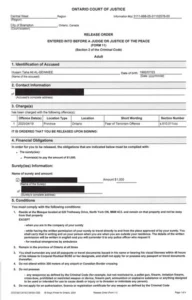A Kitchener resident who came under federal scrutiny for alleged links to terrorism is now at the center of an unprecedented bail situation after being accused of threatening police officers at Toronto’s Pearson Airport, the Toronto Sun has learned.
Husam Taha Ali Al-Sewaiee, originally from Yemen and a long-time resident of Canada, was arrested on April 15 at Pearson International Airport following an incident where he allegedly made death threats toward officers. Authorities confirmed he was charged and later released on conditions, pending a future court appearance.
According to Peel Regional Police, no physical injuries occurred and no weapons were involved. However, officials said the nature of the utterances raised significant concerns, prompting the involvement of federal security agencies.
Al-Sewaiee’s confrontation with police took place just days before a fatal police-involved shooting at the same airport, which is currently under investigation by Ontario’s Special Investigations Unit (SIU). The ongoing tensions at Pearson have left officers on high alert.
Our officers handled the situation with professionalism and ensured the individual underwent a mental health evaluation,” said Adrian Woolley, President of the Peel Regional Police Association. He confirmed that the investigation remains active.
Peace Bond Application Citing Fear of Terrorism
Following the airport incident, Al-Sewaiee appeared in Brampton court on April 19, where the Crown applied for a peace bond under section 810.01 of the Criminal Code. This provision allows for conditions to be imposed if there are reasonable fears of terrorism-related offenses.
The @rcmpgrcpolice have arrested a Yemeni man, Husam Taha Ali Al-Sewaiee, who is accused of trying to leave Canada to join a terrorist group.
Husam Taha Ali Al-Sewaiee has also previously posted to his social media, posts that have revolved around Gaza, and a video has also… pic.twitter.com/hbxxZbenRP
— HonestReporting Canada🎗️ (@HonestRepCanada) May 2, 2025
Though Al-Sewaiee is not formally charged with terrorism offenses, authorities maintain that the file is still open and under review.
Court documents reveal Al-Sewaiee had been vocal at several Toronto demonstrations supporting Gaza since the October 7th conflict in Israel. Additionally, he had informed acquaintances that he was in the process of obtaining Canadian citizenship.
Bail Conditions Raise Questions About Precedent
In a unique legal arrangement, Al-Sewaiee was granted bail on the condition that he reside at a mosque located in North Toronto. The mosque, which also contains residential quarters, became his designated place of confinement after a court-approved surety posted a $1,000 bond.

Under these bail terms, he is prohibited from leaving the mosque unless accompanied by his surety or with written court-approved exceptions for medical appointments or court proceedings. He is also barred from coming within 300 meters of any airport or Canadian border and was ordered to surrender his passport and travel documents.
Neither B’nai Brith Canada nor Israel Now offered direct comments on the specifics of Al-Sewaiee’s bail. However, B’nai Brith’s Director of Research and Advocacy, Richard Robertson, emphasized the need for stronger oversight of individuals with signs of radicalization.
“Our government must urgently address systemic vulnerabilities within Canada’s immigration and national security framework,” Robertson stated.
Meir Weinstein of Israel Now noted that while Al-Sewaiee had been visible at pro-Palestinian rallies, he recalled no direct incidents involving him personally. “We are reviewing our media archives and will assist law enforcement if needed,” he added.
Legal Experts Question Use of Religious Facilities for Bail
The decision to place an individual under investigation for terrorism concerns in a place of worship has raised eyebrows within the law enforcement community.

“This may set a precedent,” said one officer, speaking anonymously. “We’re watching closely to see if this becomes a pattern in similar cases.”
Sources indicated that the court viewed the mosque residency as the most suitable option, avoiding a return to Al-Sewaiee’s previous Kitchener residence.
Although the mosque declined to comment on the situation, police confirmed that standard bail compliance checks will continue to ensure all conditions are followed.
For now, Al-Sewaiee’s residence within the mosque under court-ordered restrictions continues as the legal process unfolds.





